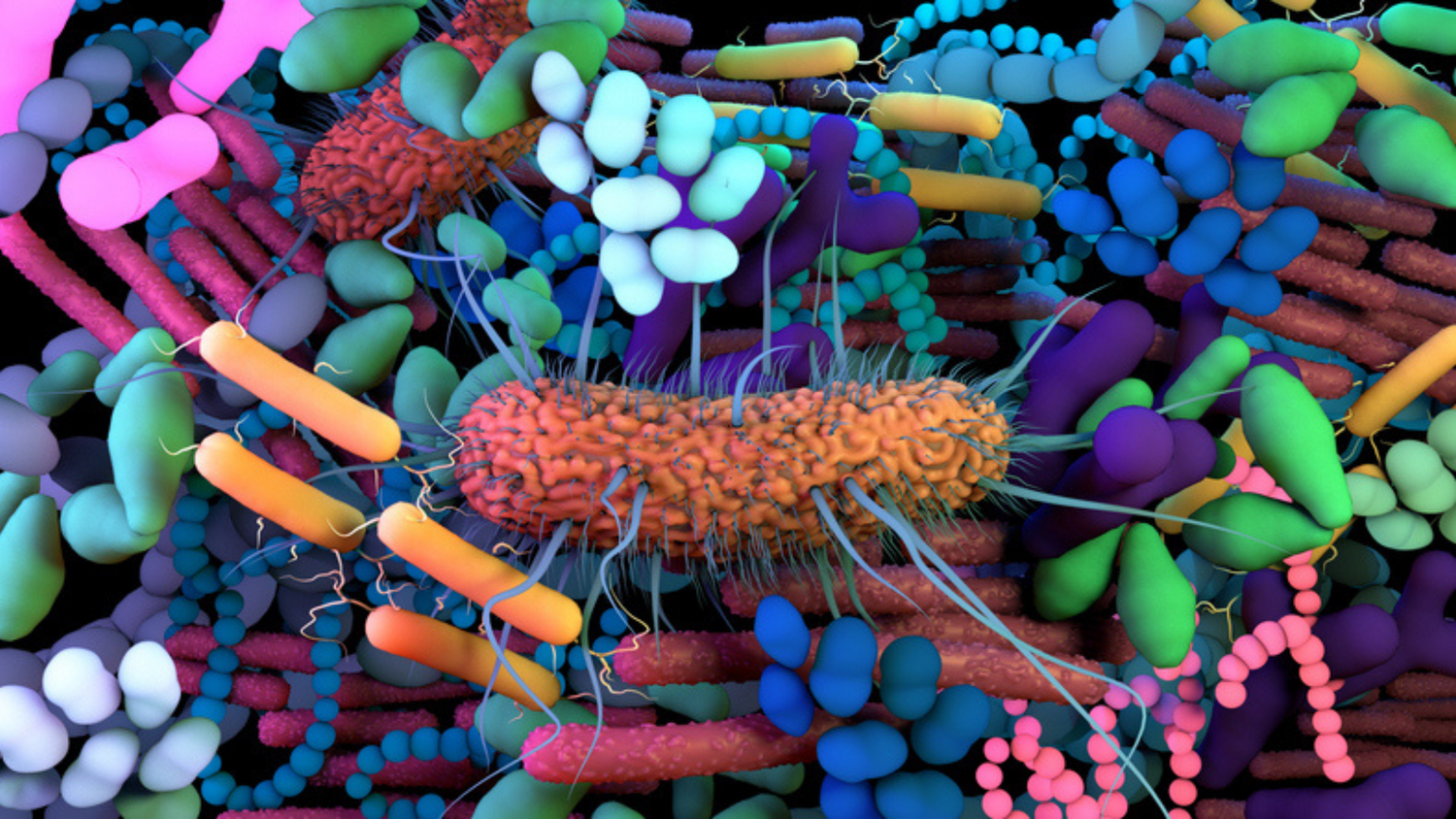The human body is an ecosystem intricately connected and influenced by trillions of microorganisms inhabiting various niches within us. Among these, the gut microbiome, a community of diverse bacteria residing in our digestive system, has garnered significant attention in recent years for its potential impact on health and aging.
Understanding the relationship between the gut microbiome and the process of aging has become a focal point for researchers exploring strategies to promote healthy longevity.
This article delves into the current understanding of how the gut microbiome influences aging and longevity (R).
The Gut Microbiome: A Microscopic World Within
The gut microbiome constitutes a thriving ecosystem of diverse microorganisms residing within our gastrointestinal tract.
This microscopic world, teeming with bacteria, viruses, fungi, and other microbes, is a dynamic and complex community unique to each individual, akin to a personalised fingerprint.
This intricate assembly of microorganisms is fundamental to various physiological functions essential for human health.
Among its myriad of functions, the gut microbiome aids in the digestion, metabolism and synthesis of nutrients, and plays a crucial role in the regulation of the immune system.
The gut microbiome's responsiveness to numerous factors throughout life makes it even more fascinating.
External influences such as diet, lifestyle, environmental exposures, medications, and even stress can significantly shape and influence the composition and diversity of this microbial community (R, R, R).
This adaptability underscores its dynamic nature and profound impact on our well-being.
The Gut-Organ Axis: It’s All Connected
Moreover, interestingly, the gut microbiome doesn't just function in isolation within the confines of the digestive system. It establishes intricate connections and bidirectional communication pathways with other bodily systems, including the immune, nervous, and endocrine systems.
This interconnectedness allows the gut microbiota to influence not only digestive health but also mental health, immune responses, and even cognitive functions (R).
Research continues to unveil the depth of this microbial universe within us, highlighting its crucial role in maintaining health and contributing to the onset or progression of various diseases.
Understanding this microbial world offers opportunities for interventions aimed at nurturing a balanced and diverse gut microbiome to promote overall health and potentially mitigate the development of certain health conditions (R).
In essence, the gut microbiome represents a microscopic world within us. This vibrant and intricate ecosystem significantly influences our health and well-being, showcasing the potential for personalised approaches to optimise health by harnessing the power of these microscopic inhabitants (R).
Ageing and the Gut Microbiome
As individuals age, there's a remarkable interplay between the aging process and the gut microbiome.
This relationship is multifaceted, influenced by various factors, including biological changes, environmental exposures, and lifestyle alterations that collectively shape the composition and function of the gut microbiota (R). There are two primary shifts in gut microbiome as we age:
Reduced Diversity with Age: Studies have highlighted that as individuals age, there's a tendency towards reduced microbial diversity within the gut. This decrease in diversity might be associated with changes in diet, medication use, physiological changes in the digestive system, and alterations in immune function (R).
Distinct Microbial Patterns: The gut microbiome of older individuals often displays different microbial compositions compared to younger counterparts. These changes can include an imbalance in the types and abundance of certain bacteria, which may impact the functionality of the gut microbiota. This altered microbial landscape might affect nutrient absorption, immune responses, and the production of essential metabolites (R).
Impact of Age-Related Changes on the Gut Microbiome
Age-related changes within the body, such as compromised immune function and increased inflammation, can further influence the gut microbiome.
The immune system undergoes alterations as people age, leading to chronic, low-grade inflammation known as "inflammaging."
This sustained inflammatory state has been linked to various age-related diseases and can impact the gut microbiota by creating an environment favouring certain types of bacteria over others (R, R).
Reciprocal Influence: Gut Microbiome and Ageing
Conversely, the gut microbiome also exerts its influence on the aging process. It plays a significant role in modulating the immune system, and its dysregulation might sustain this pro-inflammatory state seen in aging.
Furthermore, the gut microbiota communicates bidirectionally with the brain through the gut-brain axis, affecting cognitive functions and potentially influencing aspects of the aging brain.
Understanding the intricate dynamics between aging and the gut microbiome is critical. It highlights the potential for interventions to maintain or restore a healthy gut microbiota in older individuals.
Strategies such as dietary modifications, probiotics, prebiotics, and other microbial-based therapies are being explored to modulate the gut microbiome to promote healthier aging outcomes and potentially reduce the risk of age-related diseases (R, R, R, R).
Healthy Ageing and Microbial Balance
Interestingly, investigations into individuals experiencing healthy aging have unveiled distinct patterns within their gut microbiomes. These individuals tend to possess a more diverse and balanced gut microbial community than their counterparts who experience age-related health issues.
The link between a diverse gut microbiome and healthy aging implies its potential as a determinant of longevity. Strategies aimed at maintaining or restoring this microbial diversity hold promise in promoting better health outcomes as we age (R).
Interventions and Future Directions
Efforts to manipulate the gut microbiome to promote healthy aging and increased longevity are burgeoning areas of research. Probiotics, prebiotics, dietary modifications, and fecal microbiota transplantation are among the interventions explored to modulate the gut microbiota composition.
However, while these interventions showcase potential, more extensive research is necessary to comprehend the precise mechanisms by which the gut microbiome influences aging. Further studies are needed to ascertain the efficacy, safety, and long-term effects of interventions targeting the gut microbiome (R, R).
Conclusion
The gut microbiome stands as a fascinating frontier in the realm of aging and longevity. Its influence on various aspects of health, particularly in the context of aging, underscores its significance as a potential avenue for interventions aiming to promote healthy aging and extend lifespans.
As we continue to unravel the intricate relationship between the gut microbiome and aging, this field holds promise for innovative approaches to enhance health in older adults. The quest to unlock the secrets within this microscopic world within us remains an exciting journey toward healthier, longer lives.
In conclusion, nurturing a diverse and balanced gut microbiome could hold the key to healthy aging and increased longevity, promising a brighter future for the aging population.
Interested in learning more about the mysteries of the gut microbiome? Read our related article: How the Microbiome and Immune System Impact Aging: A Comprehensive Exploration.





